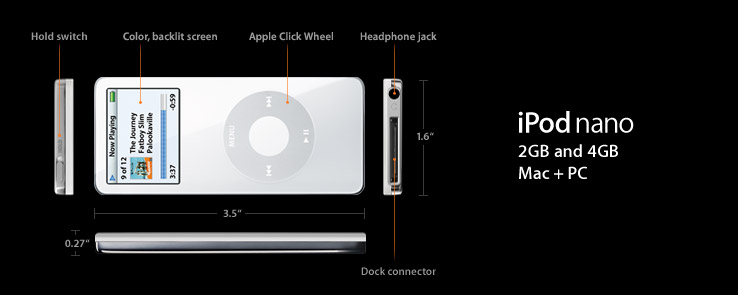
|
|
iPod nano: Will small size mean big sales?Story and Pictures from www.businessweek.com |
|
|
by Peter Burrows September 13, 2005It's been pointed out many times that the appeal of Apple Computer's iPods go far beyond bits and bytes. For most customers, it's also about form, function and fashion. But the fashion business is a tricky one that doesn't lend itself to nice predictable demand curves. It's a hits and misses business. It just so happens that Apple has had very few of the latter in recent years. So what about the new iPod nano? While the product has just hit store shelves, early indications are a bit worrisome. In a report today, Shaw Wu of American Technology Research says initial demand for the just-released iPod nano is "good, but not great." While the iPod mini immediately sold out and was on back-order at most stores for its first six months, most Apple stores have sold only about a fifth of their stocks, he says. Other informal channel checks seems to suggest the same muted reception. As for me, I stopped into the Apple Store on University Ave in Palo Alto, and saw shoppers spread out throughout the store--with no crowding to have a look at the new nanos. Why the lack of round-the-block lines? Some analysts look to the iPod nano's product specs. At $200 and $250 for two and four gigabyte models, Apple is asking consumers to pay about the same as they did for the iPod mini, which came in four and six gigabyte configurations. In other words, there's slightly less storage space for the buck. But if the nano doesn't pan out as a blockbuster, I bet it will be for a reason that goes beyond a few bucks difference in price. It will be that Apple misjudged the power of the unit's "impossibly small" size as means to generate new sales. I don't know if anyone else who was there would agree, but |
that possibility seemed palpable to me even as Jobs was giving his keynote presentation to announce the product on Sept. 7. Sure, there was far more excitement than there is for most tech product launches--but nowhere near the giddiness that accompanied the introduction of groundbreaking Apple products such as the initial Mac, the iMac, amd the iPod mini. To be sure, I'm not saying the nano isn't cool. It is, without a doubt--as most reviews suggest (personally, even more amazing than the wafer-thin size is its light-as-a-feather weight). Nor am I saying that the product will bomb, like other fashion-heavy products on Steve Jobs' product resume. Apple's decision to discontinue the iPod mini line will make sure of that. For the millions that want an iPod, there's no other choice in the vast territory between the 1-gigabyte $130 iPod shuffle and the 20-gigabyte iPod at $300. But that doesn't necessarily mean the nano will uncover a swath of new customers or new growth. That's the concern held by Harvard professor Clayton Christenson, author of the book, The Innovators' Dilemma. I called him the day after the unveiling of the Nano, assuming he would say that Apple's decision to kill the wildly popular iPod mini to make room for the nano was a text-book example of great companies take big risks to continually reinvent themselves. Instead, he's worried that Apple may be resorting to the same play--making the iPod smaller--too many times in a row. At some point, he argues, the product is small enough--and customers won't pay a premium, or pay at all, for further reductions. As he said in our initial story on the nano , "if you improve a product in a dimension of performance that really doesn't matter to the customer, you just end up spending a lot of money -- and in a sense cannibalize a beautiful product in a way that doesn't get you much more traction." Whether he's right will have a major impact on whether Apple can sustain its remarkable momentum of recent years.¶ |
|
|
|